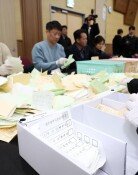[Op-Ed] Three Strikes Rule
Jang Jong-hoon, an assistant coach of the Daejeon-based pro baseball team Hanwha Eagles, won three straight homerun crowns as a player from 1990 to 1992. Making a pro team was far from easy for him, however. He was placed on the practice squad after no team signed him, with 10 players competing for one roster spot at the time. In last years draft, only 65 of the 750 players selected played in the Korean league. Whenever draft season comes around, both players and parents wring their hands.
If aspiring players want to join the league, they must apply for the draft regardless of their educational background. Those not selected find it virtually impossible to become pros. They can stay on practice squads for a year and reenter the draft the following year. Since they do not play in games, however, they usually cannot improve their skills. Other sports also use the same system.
Lee Cham, head of the Korea Tourism Organization, proposed Monday a three strikes system under which a staff member is fired if not selected by his or her superior for promotion for three consecutive years. Unlike in pro sports, this proposal will face fierce opposition from the state-run organizations workers since they believe their job security is guaranteed. Other countries apply the three strikes rule to prevent drunk driving or heinous crimes. Such a system is reasonable since chronically committing crimes or failing to advance three times indicates a problem.
In 2008, the Seoul Metropolitan Government announced a draft system for 4,200 public officials grade six and under to boost discipline. The plan fizzled out, however, as those who failed to get promoted in three tries got other positions after undergoing retraining. For public sector reform to achieve tangible results, the implementation of new approaches is needed.
Editorial Writer Park Yeong-kyun (parkyk@donga.com)







